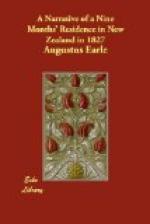His party were retreating, and the enemy were charging him vigorously; Hongi stood alone when he received the bullet; he did not fall immediately, and the enemy were eagerly running up to despatch him, when he roused all his energies, and shouted aloud for the two hundred chiefs, who lay concealed, to rush forward and fall on. The foe, hearing this, paused, when about a dozen chiefs, and indeed, as Hongi well knew, all that he had, suddenly made their appearance. This caused a panic; they turned about; the pursued became the pursuers, and nearly the whole tribe were destroyed.
CHAPTER XVI.
Interview with the great Maori conqueror.
He landed about a mile from the village, and we lost no time in procuring an interpreter, with whom we went instantly to pay our respects to this celebrated conqueror.
We found him and his party; his slaves preparing their morning repast. The scene altogether was highly interesting. In a beautiful bay, surrounded by high rocks and overhanging trees, the chiefs sat in mute contemplation, their arms piled up in regular order on the beach. Hongi, not only from his high rank (but in consequence of his wound being toboo’d, or rendered holy), sat apart from the rest. Their richly ornamented war canoes were drawn up on the strand; some of the slaves were unlading stores, others were kindling fires. To me it almost seemed to realise some of the passages of Homer, where he describes the wanderer Ulysses and his gallant band of warriors. We approached the chief, and paid our respects to him. He received us kindly, and with a dignified composure, as one accustomed to receive homage. His look was emaciated; but so mild was the expression of his features, that he would have been the last man I should have imagined accustomed to scenes of bloodshed and cruelty. But I soon remarked, that when he became animated in conversation, his eyes sparkled with fire, and their expression changed, demonstrating that it only required his passions to be roused to exhibit him under a very different aspect. His wife and daughter were permitted to sit close to him, to administer to his wants, no others being allowed so to do, on account of his taboo.




